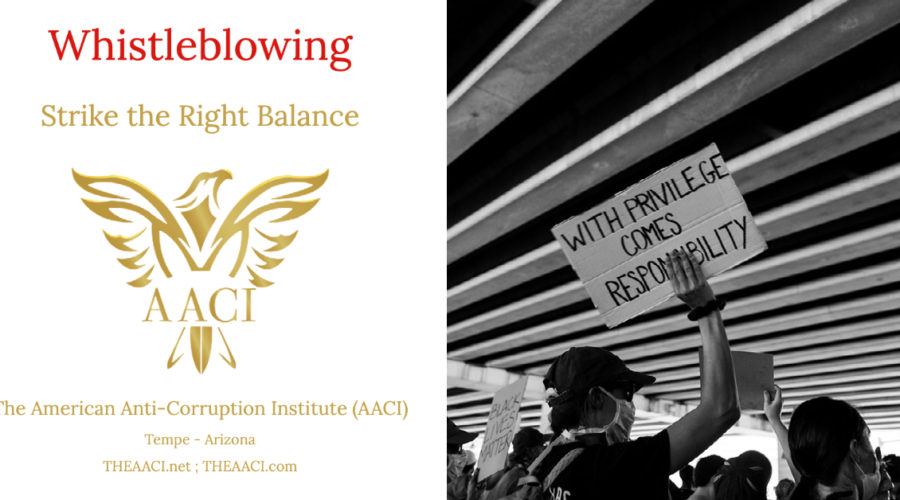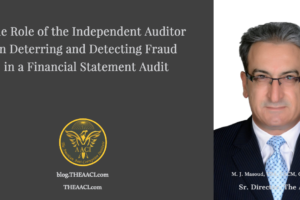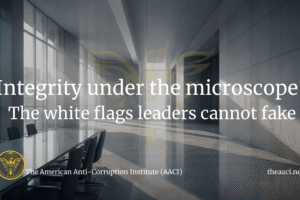September 30, 2021
“Whistleblowing is a disclosure made by a person with privileged access to an organization’s data or information about a wrongdoing, which implicates the organization, to persons or organizations that may be able to effect action’’ 1,2,3. It is a complex socio-economic phenomenon that requires careful understanding and attention of those who are charged with governance in organizations and societies. Regrettably, many developed countries do not do enough to utilize the values of whistleblowing (i.e. Germany). Unfortunately, developing nations either lack a sufficient and effective whistleblower regulatory framework or have no laws protecting whistleblowers at all.
Significance of Whistleblowing
In an organizational setting, wrongdoing could be an act that is illegal, illegitimate, or unethical. Therefore, those involved in an ill act do their utmost to cover up their fraud, corruption, or money laundering. The Association of Certified Fraud Examiners found that a typical fraud case lasts 14 months before being detected and causes a loss of $8,300 per month. It also found that 43% of fraud schemes were detected by TIP, and half of those tips came from employees 4. The Securities and Exchange Commission (SEC) states clearly the benefits of whistleblowing as it “helps the Commission identify possible fraud and other violations much earlier than might otherwise have been possible. That allows the Commission to minimize the harm to investors, better preserve the integrity of the United States’ capital markets, and more swiftly hold accountable those responsible for unlawful conduct.5“
An effective whistleblowing program supports both formal ad informal governance systems. It also helps to lower the costs and damages associated with corruption.
The Role of Those Who are Charged With Governance
The board of directors is responsible for setting up a whistleblowing program that supports the organization’s corruption prevention policy. It is also responsible for creating a culture that motivates employees, vendors, customers, and other stakeholders to communicate with those assigned in the organization wrongdoings that implicate the organization. Public servants are also required to blow the whistle and report wrongdoing.
Financial Incentives and Employer’s Retaliation
Though we recognize the importance of whistleblowing in uncovering fraud and corruption, the country’s laws and regulations should provide proper protection to whistleblowers against the employer’s reprisal. For example, “following the passage of Dodd-Frank, the SEC implemented rules that enabled the SEC to take legal action against employers who have retaliated against whistleblowers. This generally means that employers may not discharge, demote, suspend, harass, or in any way discriminate against an employee in the terms and conditions of employment who has reported conduct to the Commission that the employee reasonably believed violated the federal securities laws 6.”

Blowing the whistle is a courageous and patriotic activity. As a result, some countries passed laws to incentivize whistleblowers to speak out. On September 15, 2021, the SEC said that “its whistleblower program has now paid more than $1 billion in awards to 207 whistleblowers, including over $500 million in fiscal year 2021 alone 7.“
Education. Education. Education
As an integral part of fighting corruption in an organization, educating ALL employees about how to deter, prevent, and detect fraud, corruption, and money laundering is paramount. Investment in Corruption Prevention is the 6th Principle of Fighting Corruption promulgated by The American Anti-Corruption Institute (AACI). We consider training employees about an organization’s whistleblowing program a standard of this principle. Whistleblowers are not bad informants: they are corruption fighters.
Caveat: We are aware of the difference among countries’ whistleblowing regulatory frameworks and the legal challenges and obstacles that are relevant to whistleblowing 8.
NOTES
1. Culiberg, Barbara and Katarina Katja Mihelič. The Evolution of Whistleblowing Studies: A Critical Review and Research Agenda. Journal of Business Ethics 146, no. 4 (12, 2017): 787-803.
2. Jubb, P. B. (1999). Whistleblowing: A restrictive definition and interpretation. Journal of Business Ethics, 21(1), 77–94.
3. Miceli M. P. and Near J. P., ‘Characteristics of Organizational Climate and Perceived Wrongdoing Associated with Whistle-Blowing Decisions’ (1985) 38 Personnel Psychology 525, at 525.
4. Report to the Nations. 2020 Global Study on Occupational Fraud and Abuse. Read more on https://acfepublic.s3-us-west-2.amazonaws.com/2020-Report-to-the-Nations.pdf Accessed on September 30, 2021.
5. Read more on Office of the Whistleblower. https://www.sec.gov/whistleblower Accessed on September 30, 2021.
6. Read more on Whistleblower Protection. https://www.sec.gov/whistleblower/retaliation Accessed on September 30, 2021
7. Read more on SEC Surpasses $1 Billion in Awards to Whistleblowers with Two Awards Totaling $114 Million. https://www.sec.gov/news/press-release/2021-177 Accessed on September 30, 2021.
8. Read more on Corporate Whistleblowing Regulation:Theory, Practice, and Design, https://link.springer.com/book/10.1007%2F978-981-15-0259-0 Accessed on September 30, 2021.











































